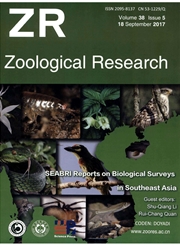

 中文摘要:
中文摘要:
Venom(toxins) is an important trait evolved along the evolutionary tree of animals. Our knowledges on venoms, such as their origins and loss, the biological relevance and the coevolutionary patterns with other organisms are greatly helpful in understanding many fundamental biological questions, i.e., the environmental adaptation and survival competition, the evolution shaped development and balance of venoms, and the sophisticated correlations among venom, immunity, body power, intelligence, their genetic basis, inherent association, as well as the cost-benefit and trade-offs of biological economy. Lethal animal envenomation can be found worldwide. However, from foe to friend, toxin studies have led lots of important discoveries and exciting avenues in deciphering and fighting human diseases, including the works awarded the Nobel Prize and lots of key clinic therapeutics. According to our survey, so far, only less than 0.1% of the toxins of the venomous animals in China have been explored. We emphasize on the similarities shared by venom and immune systems, as well as the studies of toxin knowledge-based physiological toxin-like proteins/peptides(TLPs). We propose the natural pairing hypothesis. Evolution links toxins with humans. Our mission is to find out the right natural pairings and interactions of our body elements with toxins, and with endogenous toxin-like molecules. Although, in nature, toxins may endanger human lives, but from a philosophical point of view, knowing them well is an effective way to better understand ourselves. So, this is why we study toxins.
 英文摘要:
英文摘要:
Venom (toxins) is an important trait evolved along the evolutionary tree of animals. Our knowledges on venoms, such as their origins and loss, the biological relevance and the coevolutionary patterns with other organisms are greatly helpful in understanding many fundamental biological questions, i.e., the environmental adaptation and survival competition, the evolution shaped development and balance of venoms, and the sophisticated correlations among venom, immunity, body power, intelligence, their genetic basis, inherent association, as well as the cost-benefit and trade-offs of biological economy. Lethal animal envenomation can be found worldwide However, from foe to friend, toxin studies have led lots of important discoveries and exciting avenues in deciphering and fighting human diseases, including the works awarded the Nobel Prize and lots of key clinic therapeutics. According to our survey, so far, only less than 0.1% of the toxins of the venomous animals in China have been explored. We emphasize on the similarities shared by venom and immune systems, as well as the studies of toxin knowledge-based physiological toxin-like proteins/peptides (TLPs). We propose the natural pairing hypothesis. Evolution links toxins with humans. Our mission is to find out the right natural pairings and interactions of our body elements with toxins, and with endogenous toxin-like molecules. Although, in nature, toxins may endanger human lives, but from a philosophical point of view, knowing them well is an effective way to better understand ourselves. So, this is why we study toxins.
 同期刊论文项目
同期刊论文项目
 同项目期刊论文
同项目期刊论文
 期刊信息
期刊信息
